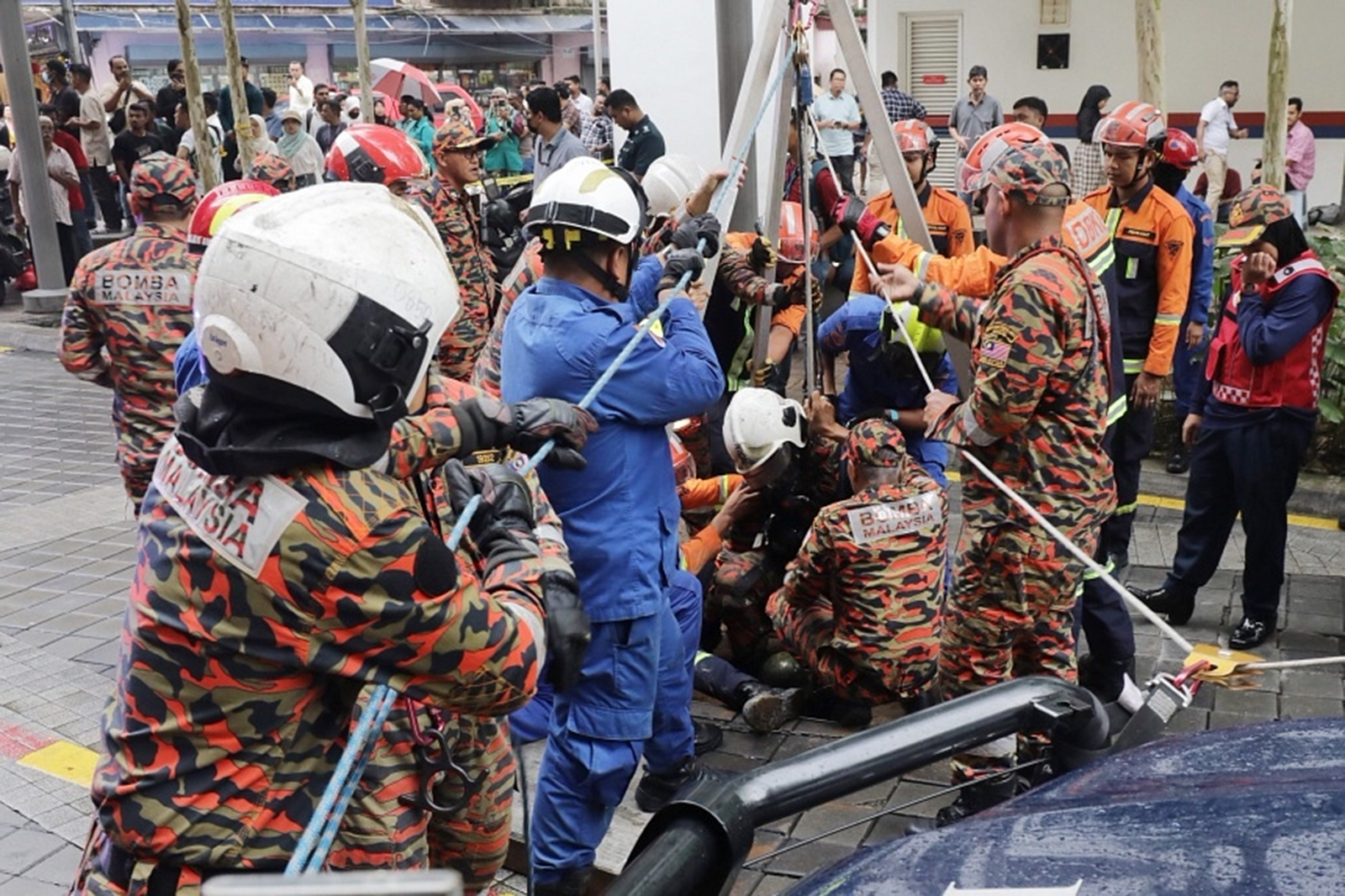
Kuala Lumpur Fire and Rescue Department deputy director Rozihan Anwar Mamat said he was also moved by the cooperation seen among the various agencies. PHOTO: THE STAR/ASIA NEWS NETWORK
PETALING JAYA, Malaysia — They slept barely two hours a day, working through day and night, to search for a stranger who had fallen into a sinkhole.
When the Malaysian search and rescue (SAR) mission had to be aborted on Aug 31 after nine days of painstaking efforts, the 80 men and women involved in the search for missing 48-year-old Indian national Vijayalaksmi felt dejected for failing to find her.
She fell 8m when the sinkhole suddenly appeared in Jalan Masjid India in Kuala Lumpur on Aug 23, in a case that made headlines around the world.
READ: Tourist swallowed by sinkhole in Kuala Lumpur, search continues
“They (the rescuers) were disheartened,” said Kuala Lumpur Fire and Rescue Department deputy director Rozihan Anwar Mamat.
“They had been prepared to descend into the sinkhole again to look for the woman although they were exhausted. We were hopeful of finding her. However, that did not happen.”
In an interview with The Star, Mr Rozihan said his team was aware the incident had made global news and that “the world was watching our every move”.
“We put in all our effort and drew up strategies to look for the woman,” said Mr Rozihan, who headed the SAR mission as the forward commander of operations.
His team included specialist divers who ventured deep into the sewer tunnels.
Mr Rozihan said the department’s standard operating procedure on SAR prohibits firemen from carrying out high-risk operations for victims who remain missing after 20 hours unless there is proof of life.
Malaysia Fire and Rescue Department officers inspect the site where a woman fell into an eight-meter deep sinkhole in Kuala Lumpur, on Aug 23. PHOTO: EPA-EFE
However, he said his team members were determined to find the woman, so they chose to go ahead with the operation.
“Since the water levels were high and currents strong in the sewer lines during the day, we had to wait for them to recede at 2am,” he said, adding that they had to wait until 4am to search the narrow tunnels before the currents started building up again.
“Only two divers can go in at a time, and we took turns every 20 minutes as the tunnels had zero visibility throughout the day and were filled with hazardous fumes.”
The case was a new experience for him and his team, Mr Rozihan said.
Besides the determination shown by his team, he said he was also moved by the cooperation seen among the various agencies.
“We had such a great inter-agency cooperation. Everyone came together and played their role. It was very touching. I will always remember this camaraderie,” he said.
READ: Huge sinkhole swallows bus, kills six in China
Kuala Lumpur Fire and Rescue Department director-general Nor Hisham Mohammad told The Star that his team was resolute in its search.
“We gave our best, searching every nook and corner of the tunnels, even when danger was lurking beneath the ground,” Datuk Nor Hisham said.
“It is the first time we had undertaken such huge risks, especially when we had to crawl deep into narrow tunnels. We did our best.”
The 80 men and women involved in the search mission felt dejected for failing to find the missing 48-year-old Indian national. PHOTO: THE STAR/ASIA NEWS NETWORK
A homeless man, who witnessed Ms Vijayalaksmi falling into the sinkhole, spoke of how he had cheated death when the ground collapsed as he was among those seated on a concrete bench next to the sinkhole.
He said his body was partially inside the hole but he managed to pull himself up.
“I saw the victim falling down as she screamed. Then there was silence after she fell into an opening at the sewer line,” he said.
The man, who is in his 30s, did not want to be identified, but he was captured on a viral video of that fateful day.
“It was a Friday. It happened in the morning. Otherwise, it would have been more crowded in the afternoon with people attending prayers at a nearby mosque using this route.
“Moreover, the homeless would be gathering here as there are volunteers from soup kitchens who come at noon to serve food,” he said.
Reconstruction to take months
According to Malaysia’s national news agency Bernama, it will take three to six months before the area affected in Jalan Masjid India can be reconstructed.
Kuala Lumpur Mayor Maimunah Mohd Sharif told the news outlet that repair works will cover the stretch from Wisma Yakin to the police post in Jalan Masjid India.
The sinkhole suddenly appeared in Jalan Masjid India in Kuala Lumpur on Aug 23, in a case that made headlines around the world. PHOTO: THE STAR/ASIA NEWS NETWORK
She added that the authorities will conduct detailed investigations into the underground utility systems and work with telecommunications companies to inspect the cables that are underground.
Some shops facing the sinkhole have begun resuming operations, but those working in the vicinity hope the authorities will conduct regular checks along the affected street for the safety of visitors and those who frequent the area.
Clothing stall worker Nora Amrizal, 36, told Bernama that traders would suffer losses if the public felt the location was unsafe following the sinkhole incident.
A special committee formed on Aug 25 will meet on Sept 2 to discuss its next steps.
“We want to prevent any further untoward incidents,” Dr Maimunah told Bernama.